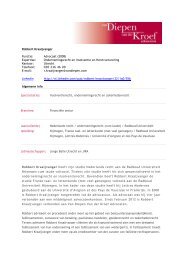© Van Diepen Van der Kroef Advocaten
© Van Diepen Van der Kroef Advocaten
© Van Diepen Van der Kroef Advocaten
- No tags were found...
You also want an ePaper? Increase the reach of your titles
YUMPU automatically turns print PDFs into web optimized ePapers that Google loves.
claim to immunity (A. Reinisch, International Organizations before National Courts, 2000,page 289). K. Wellens has expressed the same opinion (see: ‘Fragmentation of internationallaw and establishing an accountability regime for international organizations: The role ofthe judiciary in closing the gap’, in Michigan Journal of International Law, 11 May 2004).Wellens states, with reference also to Ch. Dominicé, that the right of access to the courtshould weigh more heavily than the interest of immunity (K. Wellens, op. cit., page 18):‘(…) access should prevail over immunity if no legal remedy is available.’74. The Advisory Commission on Issues arising un<strong>der</strong> Public International Law (CAVV), theprincipal advisor of the Netherlands Government on issues of international law, shares theabove view that, in the absence of any other legal remedy, the right of access to the courtis more important than the claim to immunity. Thus, the CAVV writes in Article 4.5.2 of itsReport that the national court:‘(…) should proceed to a prima facie investigation in the light of international legal normsof the availibility of adequate internal legal remedies that are available within aninternational organisation to the aggrieved party. In the event of a negative result it isdesirable that national courts do not accord immunity and proceed to settlement of thedispute at hand.’75. It is meanwhile accepted that the immunity of international organisations, such as the UN, isno longer self-evident (see A. Reinisch, in R. Hofmann et al., Die Rechtskontrolle vonOrganen <strong>der</strong> stateengemeinschaft, 2007, page 43). There are thus increasing numbers ofnational courts that, in or<strong>der</strong> to guarantee an effective protection of legal rights, do notrecognise the immunity of these organisations. Finally, the Association et al. refers in thecontext of legal practice and current law to the publication of Professor J.A. Frowein(Director Emeritus of the Max Planck Institute for Public International Law in Heidelberg andco-commentator of The Charter of the UN, B. Simma, a commentary, the leading work inthe legal field on the United Nations). In the Article “UN-Verwaltung gegenüber demIndividuum – legibus absolutus in: Allgemeines Verwaltungsrecht – Zur Tragfähigkeit einesKonzepts”, 2008, p. 333 – 347, lodged by the Association et al. at first instance as annex tothe Memorandum of Oral Pleadings, Professor Frowein reasoned as follows:<strong>©</strong> <strong>Van</strong> <strong>Diepen</strong> <strong>Van</strong> <strong>der</strong> <strong>Kroef</strong> <strong>Advocaten</strong> page 31 of 99
















